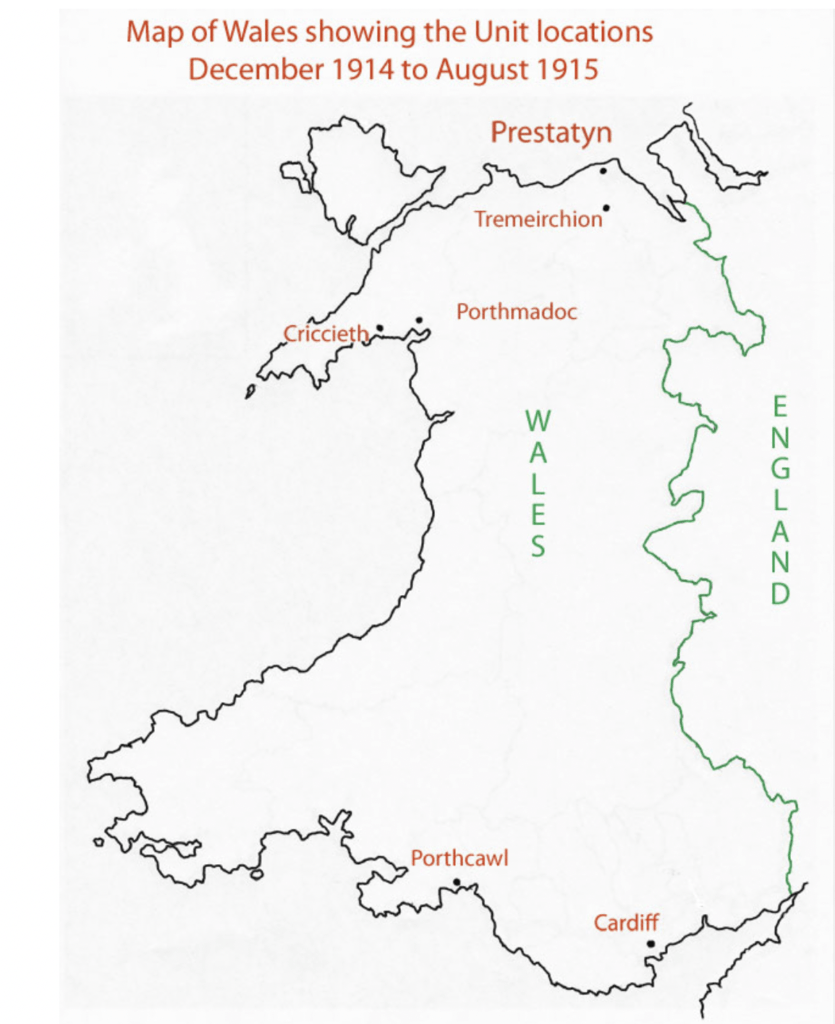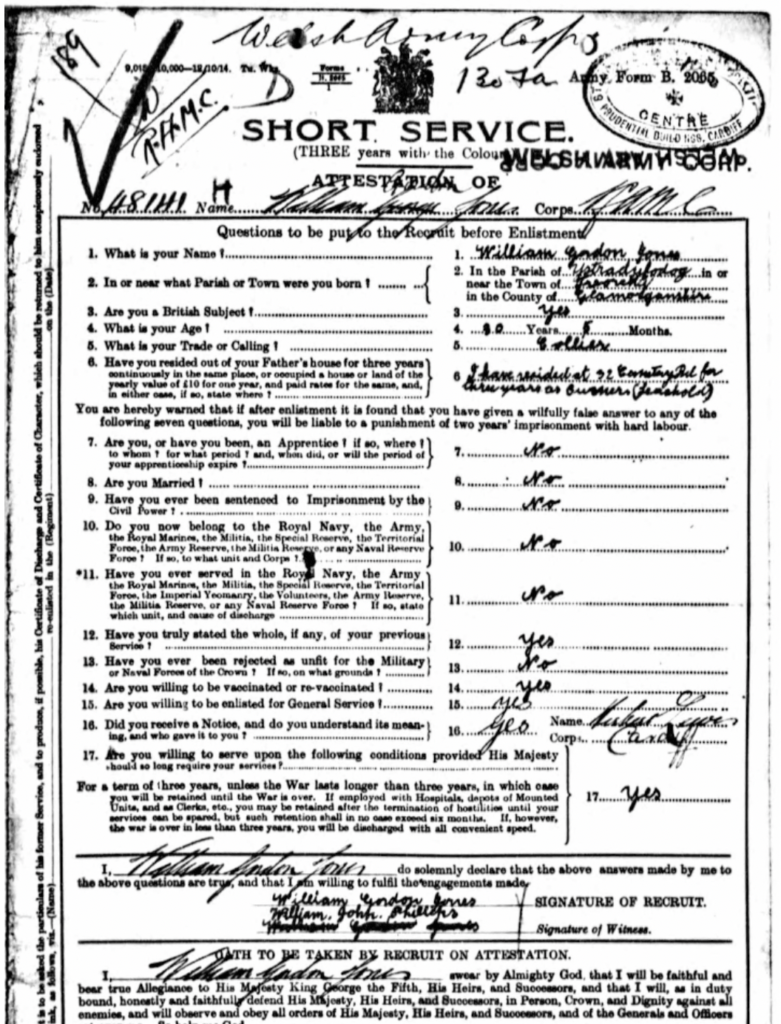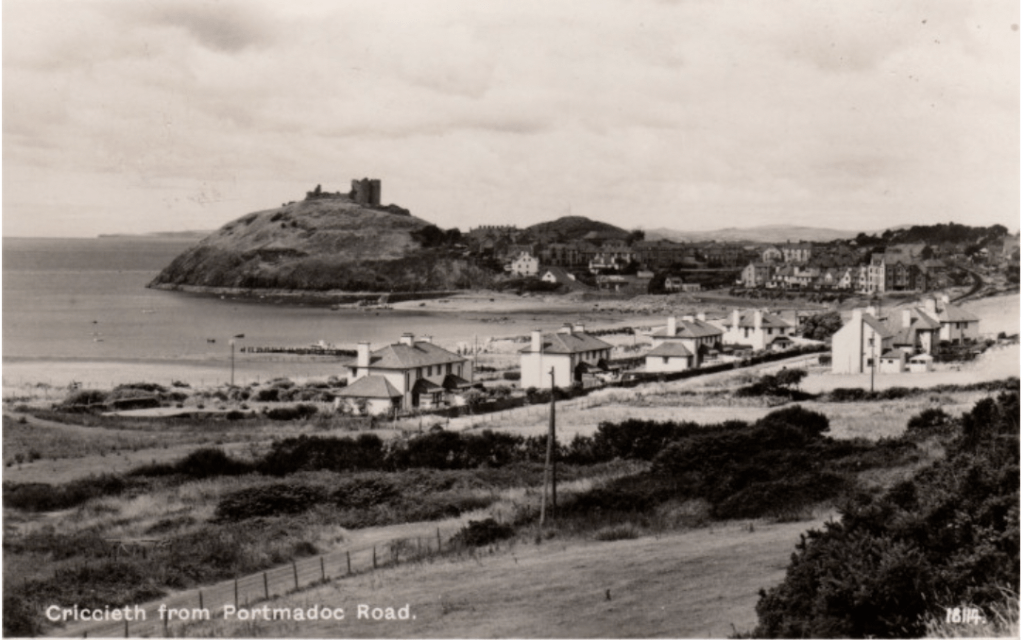At the 9.30 parade on the 17th February the men of the Unit were informed that they would move to Criccieth by route march at 11.30 the same day and to have their luggage at the station by 11.00am. Despite the short notice, the Unit managed to pack up and march off at 11.30 under Col Davies. The move was not popular with the men, as they had been treated well by the people of Porthmadoc and further more, there was no gas or electric lighting in Criccieth! The Unit’s office staff were left to pack up the H.Q. and to march to Criccieth in the early afternoon while the 20 or so ‘sick, lame or lazy’ of the Unit were to go by train at 3.45pm along with the baggage. 48135 C W Jarman was again fortunate to be billeted with his 5 friends, as at Porthmadoc, in a boarding house facing the sea, where four men from the 3rd Field Ambulance (later the 131st Field Ambulance) where also billeted. 48554 Pte George Henry Jickells records that the Unit marched the 5 miles from Porthmadoc to Criccieth on the 17th February 1915 where he was billeted in a house where the owner and landlady was the cousin of Mr David Lloyd George!

Map of Wales showing the Unit’s locations in 1914/15
The paperwork of the Unit was clearly taking a long time to complete, as on the 18th, 48135 C W Jarman was again assigned to the Unit’s office to continue getting the attestation papers of the men in the Unit in order. It was over 3 months since they signed them in Cardiff on the 12th December. He was dispatched by Major Bickerton Edwards to the H.Q. of the 1st Welch Field Ambulance (later the 129th Field Ambulance) to find the papers of around 50 men (some St John men had mistakenly joined this unit and once they discovered that the St John Ambulance Brigade were forming a separate unit, requested to be transferred across).

Attestation front page of 48141 Pte William Gordon Jones
The attestation form above is typical for the men who joined the Unit. Many have not survived the Blitz in 1940 and those that have are know as the burnt records. 48141 Pte William Gordon Jones, a 30 year old collier from Ystradfodwg in the Rhondda Valley, Glamorgan joined the Unit in Cardiff on the 12 December 1914 and was almost certainly a St John Ambulance man.
Criccieth was described as ‘rather pokey little place, and there is no gas or electric light here’, by 48135 C W Jarman. The town, shops and houses were poorly illuminated and when the Unit marched in some of the men carried candles to show the natives their contempt for the lighting arrangements. There was very little for the men to do in the evenings and so they generally stayed in their billets and read or played cards.
The men of the Unit were issued with Khaki shirts on the 20th February but still no trousers. By Monday 22nd, many of the men’s trousers had become so threadbare that they had burst at the seams so, following the morning parade, these men were ordered to line up and touch their toes and Col Davies and Major Edwards passed along the line to check that the need for new trousers was genuine, which it proved to be and they thus managed to obtain about 30 pairs of trousers to properly clothe these men. In the afternoon just as the men were falling in for parade, Capt Anderson, who had been in Bangor Hospital returned to duty. He was given a tremendous reception as he, like the other officers of the Unit, was very popular with the men.

On the 23rd, 48072 Nursing Sergeant John Reeves Davies records an interesting incident that occurred while the unit was stationed at Criccieth (courtesy of the Welsh National Library). “A suspected spy was caught coming off a boat, which ran at full speed into the harbour, he was captured and placed under arrest in the George Hotel. Guard was placed over him for about 2 hours. Then he was given in charge of the Chief Constable of Caernarfon. Eventually he turned out to be one of the Secret Service Men (British).” The diary of 48128 Sgt Francis B Sumption states that “Today a little sensation was caused by suspicions that a man who came off a little tug in the bay was a German spy. Our men formed a guard around his hotel and he was arrested and examined. The authorities were satisfied as to his identity – he was a secret naval official. But our men weren’t satisfied, they wanted to give him a swipe very badly and one usually placid man had a piece of lead piping ready to give him a downer should he prove obstreperous”. This incident was also recorded by 48135 C W Jarman who confirms the report and added that it was the talk of the Unit for some time.
The men had now been under training for nearly 3 months and were due to have another medical. On Tuesday 23rd, about a third of the Unit were examined and nearly every man had put on weight. A combination of physical exercise and an improved diet.
The men were informed at the 9.30am parade on February 24th that the Unit was to move to Prestatyn on the next day and so was dismissed for the day to pack. The men were very pleased with the news and left the parade singing ‘Every day is a moving day for us’ records 48135 C W Jarman. To the disappointment of the men, the move was postponed until the following Thursday.
On the 27th February, 48128 Sgt Francis B Sumption was finally issued with a hat!
Monday, 1st March, St David’s Day and the men were given a whole day holiday. Finally, on the 2nd March the Unit moved to Prestatyn. The Unit paraded at 8am and marched to the station. The train left at 9.20 and arrived at Prestatyn at 12.15. On arrival, the men were issued with their billet cards and 48135 C W Jarman was once again billeted with the same five friends and records that they had their first hot meal since leaving Portmadoc.

Be the first to comment